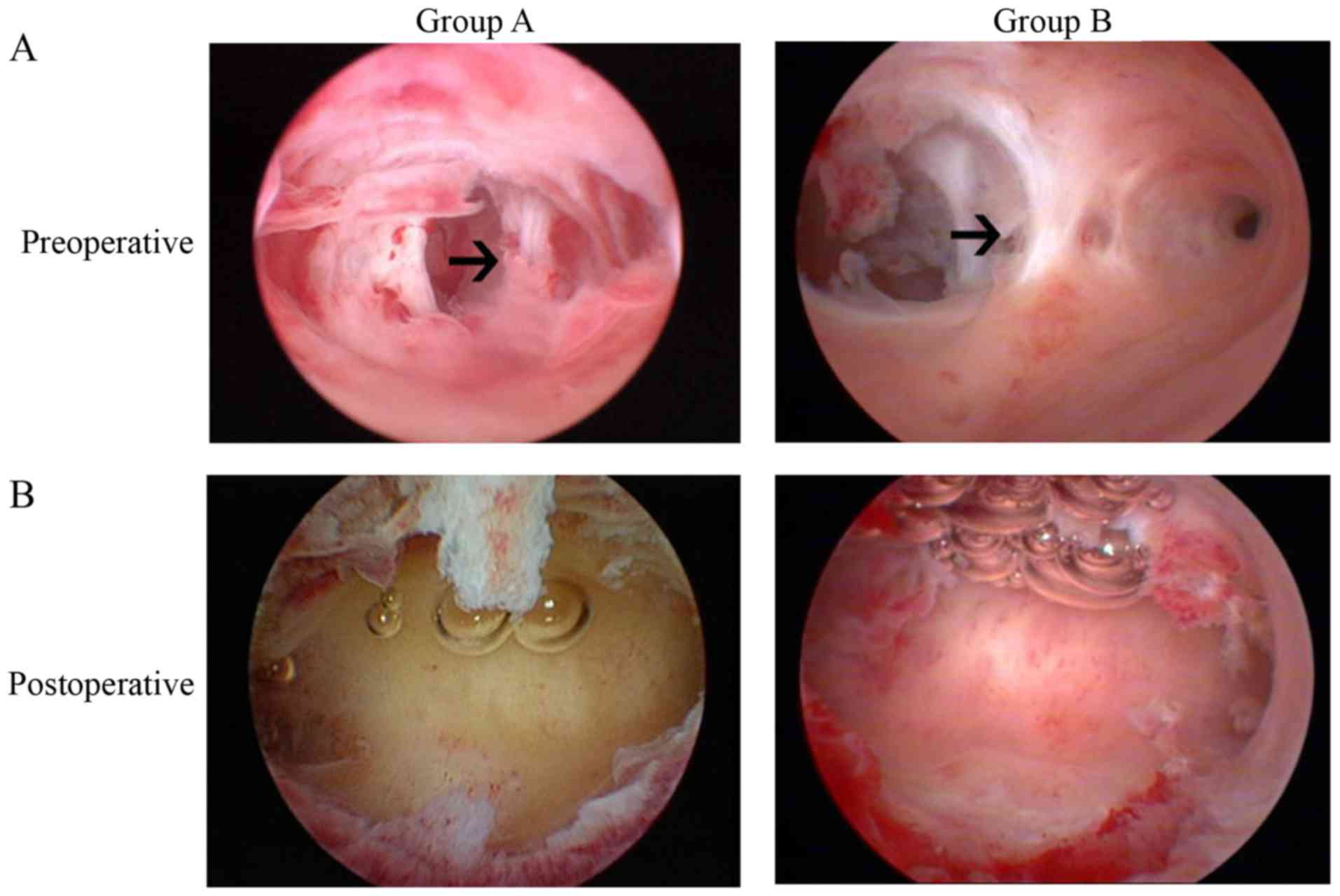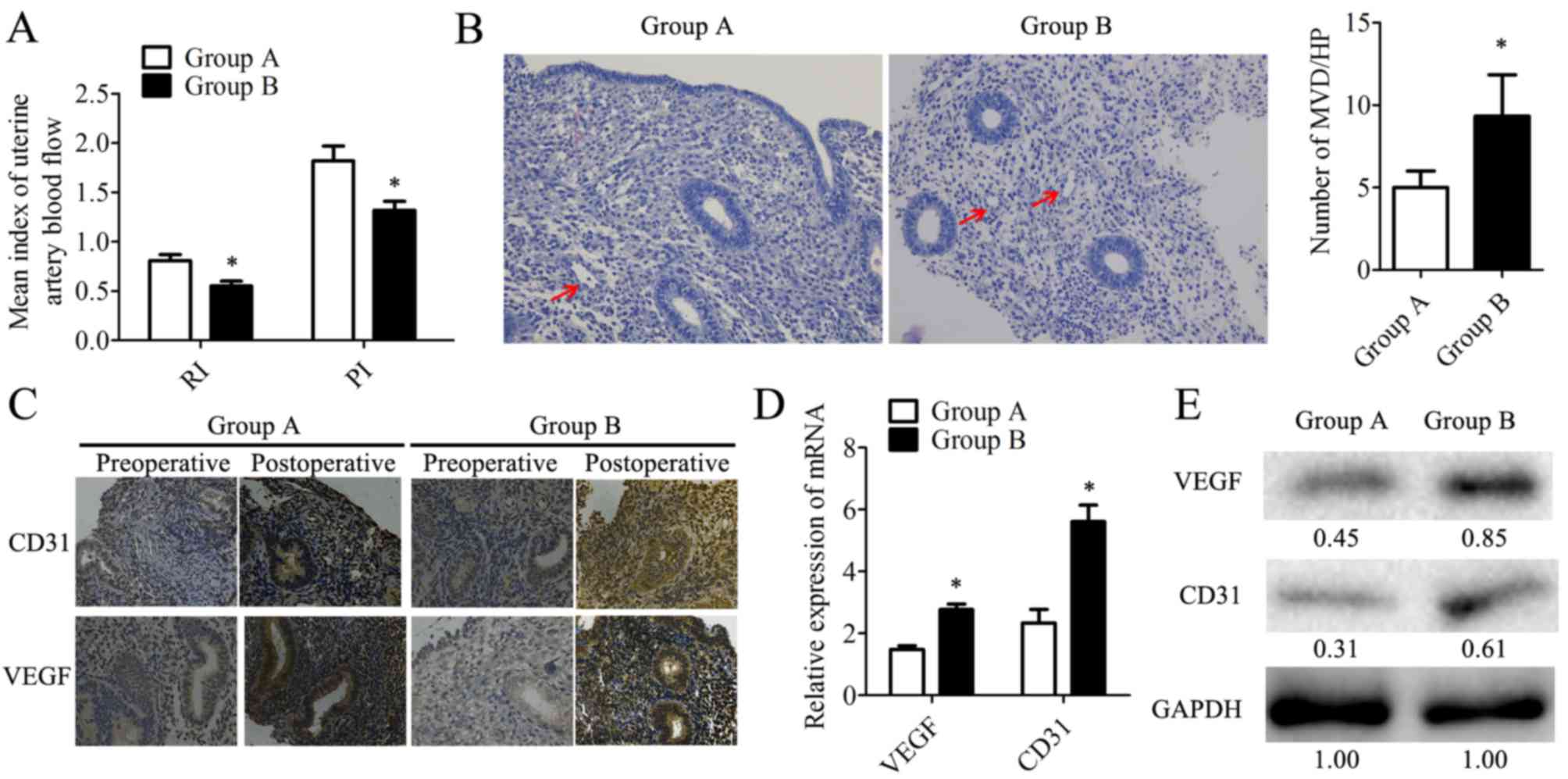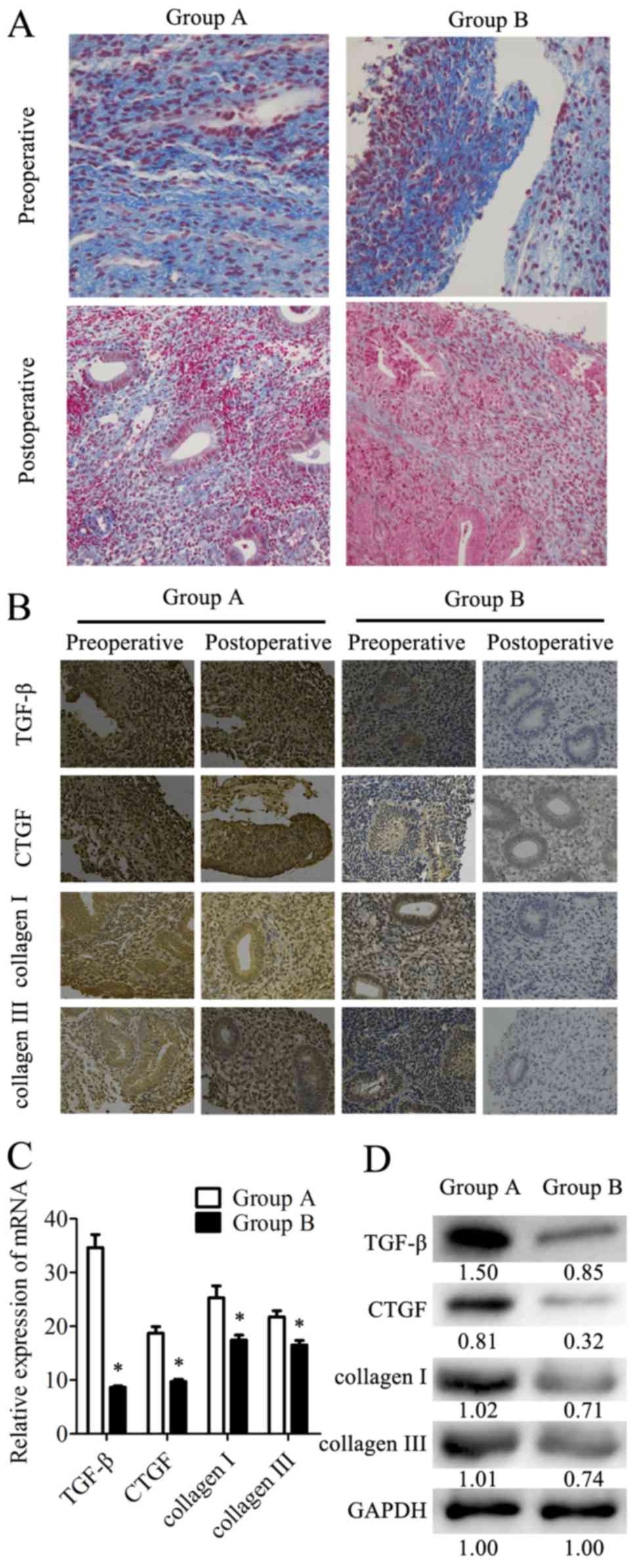|
1
|
Asherman JG: Amenorrhoea traumatica
(atretica). J Obstet Gynaecol Br Emp. 55:23–30. 1948. View Article : Google Scholar : PubMed/NCBI
|
|
2
|
Dalton VK, Saunders NA, Harris LH,
Williams JA and Lebovic DI: Intrauterine adhesions after manual
vacuum aspiration for early pregnancy failure. Fertil Steril.
85:18232006. View Article : Google Scholar : PubMed/NCBI
|
|
3
|
Deans R and Abbott J: Review of
intrauterine adhesions. J Minim Invasive Gynecol. 27:555–569. 2010.
View Article : Google Scholar
|
|
4
|
Johary J, Xue M, Zhu X, Xu D and Velu PP:
Efficacy of estrogen therapy in patients with intrauterine
adhesions: Systematic review. J Minim Invasive Gynecol. 21:44–54.
2014. View Article : Google Scholar : PubMed/NCBI
|
|
5
|
Capella-Allouc S, Morsad F,
Rongieres-Bertrand C, Taylor S and Fernandez H: Hysteroscopic
treatment of severe Asherman's syndrome and subsequent fertility.
Hum Reprod. 14:1230–1233. 1999. View Article : Google Scholar : PubMed/NCBI
|
|
6
|
AOrhue AA, Aziken ME and Igbefoh JO: A
comparison of two adjunctive treatments for intrauterine adhesions
following lysis. Int J Gynaecol Obstet. 82:49–56. 2003. View Article : Google Scholar : PubMed/NCBI
|
|
7
|
Pabuccu R, Onalan G, Kaya C, Selam B,
Ceyhan T, Ornek T and Kuzudisli E: Efficiency and pregnancy outcome
of serial intrauterine device-guided hysteroscopic adhesiolysis of
intrauterine synechiae: Fertil Steril. 90:1973–1977. 2008.
|
|
8
|
Xiao S, Wan Y, Xue M, Zeng X, Xiao F, Xu
D, Yang X, Zhang P, Sheng W, Xu J, et al: Etiology, treatment, and
reproductive prognosis of women with moderate-to-severe
intrauterine adhesions. Int J Gynaecol Obstet. 125:121–124. 2014.
View Article : Google Scholar : PubMed/NCBI
|
|
9
|
Makker A and Singh MM: Endometrial
receptivity: Clinical assessment in relation to fertility,
infertility, and antifertility. Med Res Rev. 26:699–746. 2006.
View Article : Google Scholar : PubMed/NCBI
|
|
10
|
Simon C, Moreno C, Remohi J and Pellicer
A: Cytokines and embryo implantation. J Reprod Immunol. 39:117–131.
1998. View Article : Google Scholar : PubMed/NCBI
|
|
11
|
Lédée-Bataille N, Laprée-Delage G, Taupin
JL, Dubanchet S, Frydman R and Chaouat G: Concentration of
leukaemia inhibitory factor (LIF) in uterine flushing fluid is
highly predictive of embryo implantation. Hum Reprod. 17:213–218.
2002. View Article : Google Scholar : PubMed/NCBI
|
|
12
|
Giancotti FG and Ruoslahti E: Integrin
signaling. Science. 285:1028–1032. 1999. View Article : Google Scholar : PubMed/NCBI
|
|
13
|
Krutzsch HC, Choe BJ, Sipes JM, Guo Nh and
Roberts DD: Identification of an alpha3beta1 integrin recognition
sequence in thrombospondin-1. J Biol Chem. 274:24080–24086. 1999.
View Article : Google Scholar : PubMed/NCBI
|
|
14
|
Lessey BA, Damjanovich L, Coutifaris C,
Castelbaum A, Albelda SM and Buck CA: Integrin adhesion molecules
in the human endometrium: Correlation with the normal and abnormal
menstrual cycle. J Clin Invest. 90:188–195. 1992. View Article : Google Scholar : PubMed/NCBI
|
|
15
|
Lessey BA: Endometrial receptivity and the
window of implantation. Baillieres Best Pract Res Clin Obstet
Gynaecol. 14:775–788. 2000. View Article : Google Scholar : PubMed/NCBI
|
|
16
|
Patrono C: Aspirin as an antiplatelet
drug. N Engl J Med. 330:1287–1294. 1994. View Article : Google Scholar : PubMed/NCBI
|
|
17
|
Krasopoulos G, Brister SJ, Beattie WS and
Buchanan MR: Aspirin ‘resistance’ and risk of cardiovascular
morbidity: Systematic review and meta-analysis. BMJ. 336:195–198.
2008. View Article : Google Scholar : PubMed/NCBI
|
|
18
|
Cuzick J, Otto F, Baron JA, Brown PH, Burn
J, Greenwald P, Jankowski J, La Vecchia C, Meyskens F, Senn HJ, et
al: Aspirin and non-steroidal anti-inflammatory drugs for cancer
prevention: An international consensus statement. Lancet Oncol.
10:501–507. 2009. View Article : Google Scholar : PubMed/NCBI
|
|
19
|
Rubinstein M, Marazzi A and Polak de Fried
E: Low-dose aspirin treatment improves ovarian responsiveness,
uterine and ovarian blood flow velocity, implantation, and
pregnancy rates in patients undergoing in vitro fertilization: A
prospective, randomized, double blind placebo controlled assay.
Fertil Steril. 71:825–829. 1999. View Article : Google Scholar : PubMed/NCBI
|
|
20
|
Kenigsberg L, Balachandar S, Prasad K and
Shah B: Exogenous pubertal induction by oral versus transdermal
estrogen therapy. J Pediatr Adolesc Gynecol. 26:71–79. 2013.
View Article : Google Scholar : PubMed/NCBI
|
|
21
|
Shukla A, Jamwal R and Bala K: Adverse
effect of combined oral contraceptive pills. Asian J Pharma &
Clin Res. 10:17–21. 2017. View Article : Google Scholar
|
|
22
|
Vigen C, Hodis HN, Chandler WL, Lobo RA
and Mack WJ: Postmenopausal oral estrogen therapy affects
hemostatic factors, but does not account for reduction in the
progression of subclinical atherosclerosis. J Thromb Haemost.
5:1201–1208. 2007. View Article : Google Scholar : PubMed/NCBI
|
|
23
|
Johary J, Xue M, Zhu X, Xu D and Velu PP:
Efficacy of estrogen therapy in patients with intrauterine
adhesions: Systematic review. J Minim Invasive Gynecol. 21:44–54.
2014. View Article : Google Scholar : PubMed/NCBI
|
|
24
|
Chi Y, Yang X, He P, Lei L, Yi Lan Y and
Liu L: Efficiency of estradiol gel in treatment of moderate or
severe intrauterine adhesion. J Reprod Med. 25:691–695. 2016.(In
Chinese).
|
|
25
|
Bagot CN, Marsh MS, Whitehead M, Sherwood
R, Roberts L, Patel RK and Arya R: The effect of estrone on
thrombin generation may explain the different thrombotic risk
between oral and transdermal hormone replacement therapy. J Thromb
Haemost. 8:1736–1744. 2010. View Article : Google Scholar : PubMed/NCBI
|
|
26
|
American Fertility Society (1988) The
American Fertility Society classifications of adnexal adhesions,
distal tubal occlusion, tubal occlusion secondary to tubal
ligation, tubal pregnancies, Mullerian anomalies and intrauterine
adhesions. Fertil Steril. 49:944–955. 1988. View Article : Google Scholar : PubMed/NCBI
|
|
27
|
Livak KJ and Schmittgen TD: Analysis of
relative gene expression data using real-time quantitative PCR and
the 2(-Delta Delta C(T)) method. Methods. 25:402–408. 2001.
View Article : Google Scholar : PubMed/NCBI
|
|
28
|
Carmeliet P and Jain RK: Angiogenesis in
cancer and other diseases. Nature. 407:249–257. 2000. View Article : Google Scholar : PubMed/NCBI
|
|
29
|
Al-Inany H: Intrauterine adhesions. An
update. Acta Obstet Gynecol Scand. 80:986–993. 2001. View Article : Google Scholar : PubMed/NCBI
|
|
30
|
Socolov R, Anton E, Butureanu S and
Socolov D: The endoscopic management of uterine synechiae. A
clinical study of 78 cases. Chirurgia (Bucur). 105:515–518.
2010.PubMed/NCBI
|
|
31
|
Capella-Allouc S, Morsad F,
Rongières-Bertrand C, Taylor S and Fernandez H: Hysteroscopic
treatment of severe Asherman's syndrome and subsequent fertility.
Hum Reprod. 14:1230–1233. 1999. View Article : Google Scholar : PubMed/NCBI
|
|
32
|
Schisterman EF, Gaskins AJ and Whitcomb
BW: Effects of low-dose aspirin in in-vitro fertilization. Curr
Opin Obstet Gynecol. 21:275–278. 2009. View Article : Google Scholar : PubMed/NCBI
|
|
33
|
Zhao M, Chang C, Liu Z, Chen LM and Chen
Q: Treatment with low-dose aspirin increased the level LIF and
integrin β3 expression in mice during the implantation window.
Placenta. 31:1101–1105. 2010. View Article : Google Scholar : PubMed/NCBI
|
|
34
|
Kang X, Wang T, He L, Xu H, Liu Z and Zhao
A: Effect of low-dose aspirin on midluteal phase uterine artery
blood flow in patients with recurrent pregnancy loss. J Ultrasound
Med. 35:2583–2587. 2016. View Article : Google Scholar : PubMed/NCBI
|
|
35
|
Lazzarin N, Vaquero E, Exacoustos C,
Bertonotti E, Romanini ME and Arduini D: Low-dose aspirin and
omega-3 fatty acids improve uterine artery blood flow velocity in
women with recurrent miscarriage due to impaired uterine perfusion.
Fertil Steril. 92:296–300. 2009. View Article : Google Scholar : PubMed/NCBI
|
|
36
|
Burch JW, Stanford N and Majerus PW:
Inhibition of platelet prostaglandin synthetase by oral aspirin. J
Clin Invest. 61:314–319. 1978. View Article : Google Scholar : PubMed/NCBI
|
|
37
|
Kershenobich Stalnikowitz D and Weissbrod
AB: Liver fibrosis and inflammation. A review. Ann Hepatol.
2:159–163. 2003.PubMed/NCBI
|
|
38
|
Stramer BM, Mori R and Martin P: The
inflammation-fibrosis link? A Jekyll and Hyde role for blood cells
during wound repair. J Invest Dermatol. 127:1009–1017. 2007.
View Article : Google Scholar : PubMed/NCBI
|
|
39
|
Jiang HS, Zhu LL, Zhang Z, Chen H, Chen Y
and Dai YT: Estradiol attenuates the TGF-β1-induced conversion of
primary TAFs into myofibroblasts and inhibits collagen production
and myofibroblast contraction by modulating the Smad and Rho/ROCK
signaling pathways. Int J Mol Med. 36:801–807. 2015. View Article : Google Scholar : PubMed/NCBI
|
|
40
|
Benjamim CF, Guilherme RDF, Nogueira TDO,
Neves JS and Canetti CDA: Aspirin-triggered Resolvin D1, atrvd1,
reverts chronic pulmonary fibrosis in a murine model pulmonary
fibrosis. American J Resp Crit Care Med. 193:A49382016.
|


















